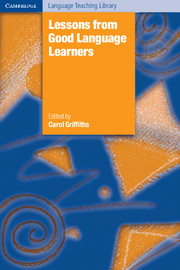Book contents
- Frontmatter
- Contents
- List of contributors
- Acknowledgements
- Editor's overview
- Prologue
- Reflections
- Part I Learner variables
- 1 Motivation and good language learners
- 2 Age and good language learners
- 3 Learning style and good laguage learners
- 4 Personality and good language learners
- 5 Gender and good language learners
- 6 Strategies and good language learners
- 7 Metacognition and good language learners
- 8 Autonomy and good language learners
- 9 Beliefs and good language learners
- 10 Culture and good language learners
- 11 Aptitude and good language learners
- Part II Learning variables
- The learners' landscape and journey: a summary
- Index
7 - Metacognition and good language learners
Published online by Cambridge University Press: 11 August 2009
- Frontmatter
- Contents
- List of contributors
- Acknowledgements
- Editor's overview
- Prologue
- Reflections
- Part I Learner variables
- 1 Motivation and good language learners
- 2 Age and good language learners
- 3 Learning style and good laguage learners
- 4 Personality and good language learners
- 5 Gender and good language learners
- 6 Strategies and good language learners
- 7 Metacognition and good language learners
- 8 Autonomy and good language learners
- 9 Beliefs and good language learners
- 10 Culture and good language learners
- 11 Aptitude and good language learners
- Part II Learning variables
- The learners' landscape and journey: a summary
- Index
Summary
Metacognition can be defined simply as thinking about thinking (Anderson, 2002, 2005). It is the ability to reflect on what is known, and does not simply involve thinking back on an event, describing what happened, and the feelings associated with it. Metacognition results in critical but healthy reflection and evaluation of thinking that may result in making specific changes in how learning is managed, and in the strategies chosen for this purpose (for a discussion of strategies, see Griffiths, this volume).
Strong metacognitive skills empower language learners: when learners reflect upon their learning, they become better prepared to make conscious decisions about what they can do to improve their learning. O'Malley and Chamot (1990, p. 8) emphasize the importance of metacognition when they state: “students without metacognitive approaches are essentially learners without direction or opportunity to plan their learning, monitor their progress, or review their accomplishments and future learning directions.” Metacognition, in language learning, as illustrated in Figure 1 (see p. 100), can be divided into five primary and intersecting components:
preparing and planning for learning
selecting and using strategies
monitoring learning
orchestrating strategies
evaluating learning.
Views of metacognition
In his great work Les Miserables, Victor Hugo wrote, “Where the telescope ends, the microscope begins. Which of the two has the grander view?” (Hugo, 1992, p. 767). The metaphorical telescope and microscope are useful for looking at the concept of metacognition.
- Type
- Chapter
- Information
- Lessons from Good Language Learners , pp. 99 - 109Publisher: Cambridge University PressPrint publication year: 2008
- 28
- Cited by



